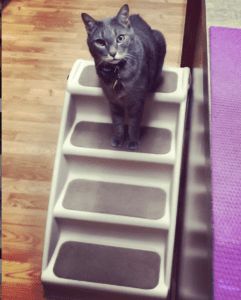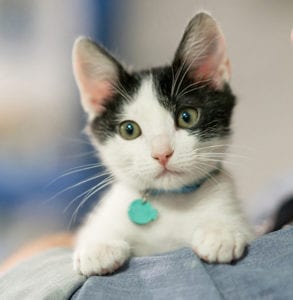Why We Love Cats
 At Caring Hearts Animal Hospital, it is no secret we love cats. Our resident clinic cat Maddox is always here sharing his good vibes, head butts and kitty purrs with our team and the occasional lucky clients. That is why we are pumped that September is Happy Cat Month! This is a time to make sure our cats are living their best lives. Cats have given so much to humans over the ages. From companionship to pest control they make our lives better. Now it is our turn to make sure they are healthy and happy.
At Caring Hearts Animal Hospital, it is no secret we love cats. Our resident clinic cat Maddox is always here sharing his good vibes, head butts and kitty purrs with our team and the occasional lucky clients. That is why we are pumped that September is Happy Cat Month! This is a time to make sure our cats are living their best lives. Cats have given so much to humans over the ages. From companionship to pest control they make our lives better. Now it is our turn to make sure they are healthy and happy.
Here are some interesting Cat Facts:
- Spayed cats live an average of 3.1 years-almost 40%-longer than un-spayed cats
- Neutered cats live an average of 11.8 years-over 60%-longer than un-neutered cats
- The average lifespan of cats has increased one year-10%-since 2002
- Arthritis has gone up 67% in the past five years
- Kidney disease is 7 times more likely in cats than in dogs
- Almost 60% of adult cats have dental tarter
- About a quarter of all cats are overweight
- And most shocking: In 2011, 45% of cats did not receive veterinary care
*source Banfield State of Pet Health 2013 -2014
There are many reasons people don’t bring their cats for veterinary care. Some don’t know the signs of illness. Some don’t understand the level of care cats should have to live well. Some just dread putting the cat in a carrier to bring them in. We have the answers.
Since cats are fairly stoic, they hide pain until they can’t. When a cat has dental pain, they will often do something called “chattering” with their jaw. This is different from when they see “prey” and chirp and chatter. Other pain signs are drooling, bad breath and loss of appetite. Examining the mouth at least yearly by our veterinary team is highly recommended to look for damaged or broken teeth and a condition called stomatitis where the gums are swollen and inflamed. Tooth resorption is very common in cats and also very painful. You may notice your cats mouth being open or pawing at the face if a tooth is hurting. Routine cleaning and dental x-rays catch many of these problems early before they are horribly painful.
 Other signs of medical problems in cats are diminished grooming, giving the cat an oily and or matted coat look. This is particularly noticeable near the rear when arthritic changes cause the cat pain when turning or trying to lift the hind legs.
Other signs of medical problems in cats are diminished grooming, giving the cat an oily and or matted coat look. This is particularly noticeable near the rear when arthritic changes cause the cat pain when turning or trying to lift the hind legs.
A red alert for all cats is inability to eliminate urine. Sometimes the first sign is when a normally excellent cat starts to urinate outside the box. Male cats have a greater tendency to this problem which can be aggravated by lack of water intake or a diet that is not formulated to prevent urinary stone formation. Urinary stones clog the tube that leads from the bladder to the outside of the body. Cats will strain to pass urine and often cry out. If left too long the bladder, much like a balloon filled with water, will burst. Urinary blockage is an emergency so if you see these signs do not delay getting your cat to our practice or to the ER.
As cats age they tend to develop kidney disease and hyperthyroidism. If your cat has lost weight, looks thin, has a dull coat and is drinking an unusual amount of water get them in quickly. Often a simple dietary change can slow the progression of kidney disease and inexpensive thyroid medications get the hormonal imbalance back to normal.
The best option for cats is a visit to the veterinarian at lest annually and if they are older monitoring them twice a year is wise. Running blood panels to check for organ function, examining the skin and coat, checking eyes, ears and nose, and feeling the body and joints are all part of good cat care along with recommended vaccinations and parasite testing and control. Quality food, proper exercise and mental stimulation all work together to make a happy cat.
But what about that trip to the vet? WE’VE GOT THIS!
We have solutions to make your cat have a better visit using our Fear Free skills and techniques. Because of our intense concern for our patients mental wellbeing we can share many ideas such as:
- Acclimate your cat to its carrier 2 weeks before the visit if possible. Leave the carrier out and entice your kitty with food and treats. Put it in a place where your cat can feel safe and secure and visit often.
- On the trip over place a lightweight towel or small blanket over the carrier so your kitty can’t see the outside world. This gives them a safe “hidey hole” for their trip. Put them in the floorboard or seatbelt the carrier to avoid sliding around.
- Play classical music on the radio. Yep it sounds crazy, but many studies have seen animals who couldn’t be soothed with drugs have positive reactions to music.
- Carry your carrier like a gift of fine crystal. Carry it with both hands and not by the handle. Keep it level and try not to jostle it. Also don’t set it on the floor but instead in a chair or table. Cats are both predator and prey so being low in a strange place is very frightening.
- Get some pheromones. Feliway spray is very effective in making your cat feel calm. This spray mimics the “happy cat” pheromones our kitties rub on their favorite places (and us) from their cheeks. Spray your cats bedding and the towel used to cover the carrier at least 15 minutes before you put the cat inside. We use this in our exam rooms and on our clothes too.
- If your cat has high anxiety or previous bad experiences at other vets, we understand. Fear is a stressor, but we have medication cocktails to ease the way. Call our team a few days before your planned visit and we can send you home with a nice previsit medication. By creating a calm visit for your cat – even medicated- we are not reinforcing the scary events of the past but replacing them with a positive event. Working together we can help your cat be calm and relaxed for veterinary care.
So have a party and celebrate the wonderful friend that is your cat. We are certainly going to do something special for our cute kitties. Happy Cat Month- cause cats rule!
Recent Posts
About Us
At Caring Hearts Animal Hospital, we’re not your typical veterinarian in Matthews, NC. We have been welcoming dogs and cats from Mint Hill, Indian Trail, and Union County for over 15 years, and our team is comprised of pet owners, too–so we appreciate the bond you share with your companions!
